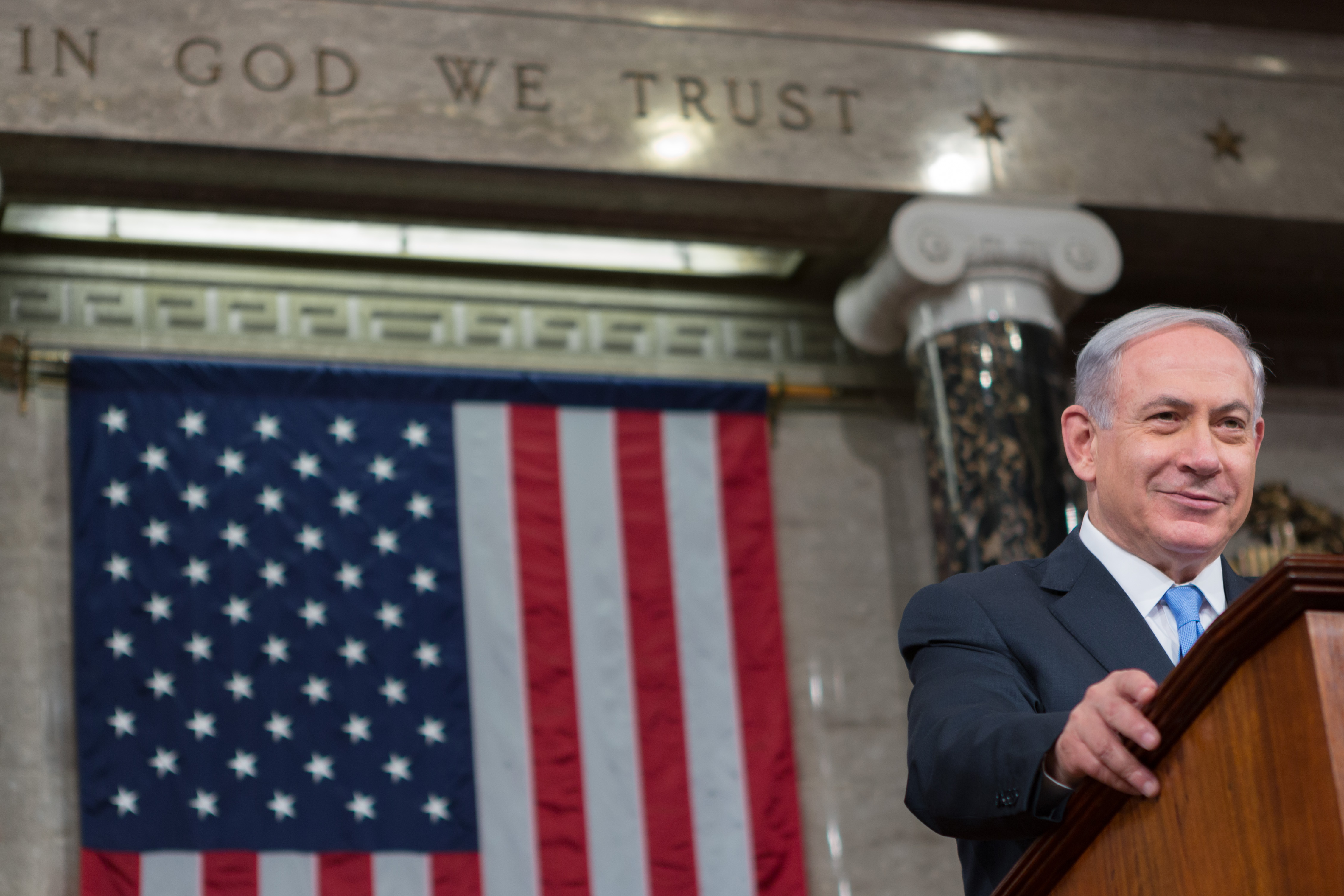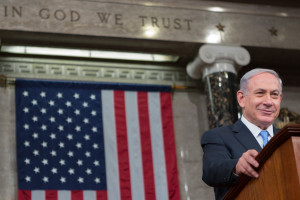A Future for Israeli Democracy
 Prime Minister Benjamin Netanyahu of Israel concludes his third address before a joint meeting of Congress and reaffirms the strong bonds between Israel and the United States.
March 3, 2015. (Official Photo by Caleb Smith)
Prime Minister Benjamin Netanyahu of Israel concludes his third address before a joint meeting of Congress and reaffirms the strong bonds between Israel and the United States.
March 3, 2015. (Official Photo by Caleb Smith)

March 3, 2015. (Official Photo by Caleb Smith)
On December 31, Israel’s education ministry confirmed that it had banned Dorit Rabinyan’s novel Borderlife from high school curriculums. The book, the winner of Israel’s prestigious Bernstein literary prize, recounts the love story of a Jewish woman and Palestinian man. Israeli news outlet Ha’aretz quotes ministry official Dalia Fenig writing in a letter that “adolescent youth tend to romanticize and don’t have, in many cases, the systematic point of view that includes considerations about preserving the identity of the nation and the significance of assimilation.”
The government’s rejection of the novel created an uproar at home and abroad, with critics accusing the government of censorship with the intention of preserving the Israel’s national identity, which apparently does not involve intermarriage between Israeli Jews and Palestinian Arabs. These Palestinian Arabs, on the other hand, make up one fifth of Israel’s citizenry and of whom 2.1 million live under Israeli occupation in the West Bank, East Jerusalem, and Gaza. The banning of Rabinyan’s novel from school curricula adds to the international discourse on whether the State of Israel can be both a Jewish and democratic state, or if it will hold Jewish principles above democratic ideals.
The discussion at hand involves the distinction between pre-1967 Israel, which does not include the West Bank and Gaza, and “Greater Israel” – an expression for the Zionist goal of uniting the greater “Promised Land” under Israeli rule – which includes the West Bank and East Jerusalem. The present Greater Israel is able to call itself a democracy, despite its prolonged military occupation of Gaza and the West Bank under the excuse that international humanitarian law does not grant a people living under “temporary” military occupation the right to vote for the institutions of the occupying power. The key word here is “temporary,” yet the occupation has lasted nearly a half century and there is no end in sight, now that recently-elected Prime Minister Benjamin Netanyahu promised that there would be no Palestinian state during his tenure in office. An occupation’s being temporary implies that there is an end in sight – and there is none for Palestinians living under Israeli rule.
As Netanyahu’s right-wing government becomes more clear on its stance against a two-state solution or an end to the settlements in the West Bank, more and more people in the international community are calling the legitimacy of Israeli democracy into question. Most glaringly, Israeli settlers are extended the right to vote, but nearly 2 million Palestinian residents are denied representation in the government which occupies them, and have been under these cirucmstances for the last 49 years. U.S. President Obama stated in 2015 that it would be difficult for the United States to continue backing Israel in the United Nations, unless these practices end and Israel adopts a more openly democratic values.
Furthermore, one in five Israeli citizens are Palestinian Arabs, but, according to the Israel Democracy Institute, more than half of Israeli Jews are against full equality for the Arabs, and less than a third support Palestinian Arab political parties. This sentiment is reflected even after official military rule ended in 1967. Non-Jews (with the exception of the Druze) cannot perform military service, which bars them from a broad spectrum of services and benefits, and effectively diminishes the opportunity for social mobility that any Jewish Israeli would have. Moreover, only a fraction of the government budget is allocated for the maintenance and building of infrastructure in Palestinian towns within Israel. Palestinian citizens in occupied territories face similar difficulties.
Finally, bout 100,000 people live in “unrecognized” villages, mostly in the Negev and in the north, which officially do not exist. This means that even the most basic services are not made available to their inhabitants, such as running water, health services, sanitation, electricity, safe roads, adequate education facilities, or postal and other communication services. So the definition of liberal democracy, which involves equality under the law, is contradicted by the Israeli government’s actions with regard to Palestinian Arab minorities, despite Israel’s claim to be a liberal democracy.
The purpose of this article is not to attack Israel’s right to exist as a secure Jewish state. However, problems lie within systematic contradictions between Israel’s declarations that it is the only democracy in the Middle East and its practices which deny political rights to people living under its direct or indirect control. In order for Israel to be true to its Basic Law on Human Dignity and Liberty as a “Jewish and democratic state,” it must withdraw its troops from the occupied territories, but also end systemic discrimination against Israeli Arabs by extending equal voting and political rights to any individual living under Israeli rule, including the inhabitants of Gaza and the West Bank, if it is so determined to keep those areas under Israeli sovereignty.
Israel must be a Jewish state legitimized by democratic means, and the unimpeded will of its citizens regardless of ethnic or religious qualifications. If Israel deems this impossible for whatever reasons, then it must accept that it is not a democracy and will only be a Jewish state that undermines international law and human rights.
To reiterate, this article does not deny Israel’s right to exist as a secure Jewish state, but calls into question its current affirmation that it is a liberal democracy. In order to dispel international skepticism about its status as a democracy, Israel must confront and reform the realities of its prolonged military occupations and its treatment of non-Jewish minorities within Israel as “fifth columns.”
